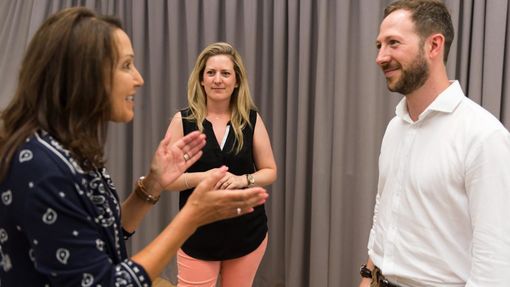Are you starting to return to the office?
September brings the beginning of a new academic year, and this particular year, it also brings more opportunities to return to working in the office.
At Central itself, staff are also beginning to return to the office. While there is excitement at seeing colleagues and about being in a more social environment, many people are feeling understandably anxious. After more than a year of seeing colleagues on a screen, the idea of seeing everyone face-to-face again can feel a bit overwhelming!
It may seem strange to be nervous about going back to the office, when you worked there quite happily before. But the fact is that humans will relax and feel secure when they are in familiar situations. Because the office environment has become unfamiliar, we’re much more likely to be ‘on edge’, looking out for potential threats. This reaction will subside over time, as the office becomes ‘familiar’ once again, but there are things you can do to help support yourself through the transition.
1. Acknowledge your feelings
Remember that you’re human, and to be uneasy about change and transition is completely normal. Sometimes people will try to push down any unwanted feelings, pretending they aren’t there and ‘just getting on with it’. But this technique means your energy is split between trying to bury your nerves and the activity you’re trying to engage in. Rather than trying to pretend that you ‘feel fine’ or telling yourself that you ‘shouldn’t feel nervous’, try acknowledging how you feel. Saying to yourself ‘I feel nervous and scared, and that’s ok – it’s totally understandable that I would feel these things in this situation. I can feel my feelings and still do what I need to do’ allows you to accept yourself as you are in the moment, then to give all your attention to that upcoming team meeting or presentation.
2. Stay grounded
When we are anxious, our energy tends to lift upwards in our bodies – our breath goes high in our chests, and tension gathers in our neck and shoulders. To counteract this, try planting both feet on the floor. If you’re standing, make sure your weight is evenly balanced between both feet, and that your weight is not all in your heels, or all in your toes, but evenly spread between them. If you’re sitting, have your feet on the floor and sit with your weight evenly balanced. Bring your awareness to your feet (and to your bottom if you’re sitting!) and think about that connection to the earth beneath you, and the strong support that it’s giving you. You can use the classic drama school idea of being like a tree, with roots growing into the ground from your feet, anchoring and supporting you. Know that you are being supported and held by this strong base, and you can always bring your attention back to it if you are feeling anxious.
3. If in doubt…breathe out!
Our breath is our most useful tool when it comes to managing nerves and anxiety. Deep, slow breathing can help us to feel calm and centred, and helps to ‘switch on’ the systems in our body that tell it there’s no threat present, and that it can relax. The easiest way to access this breathing is to focus on your outbreath. Breathe out through your mouth slowly – try not to let yourself collapse through your spine as you do this, but keep your posture engaged. As you come towards the end of your breath, you will feel your stomach muscles pulling inwards, pushing air out of your lungs. When you feel the need to take a breath in, simply release those stomach muscles and keep your mouth/airway open – the air will rush in all by itself, without you needing to ‘take’ the breath. Allowing the body to do what it does naturally is the most calming way to breathe – try it if you’re starting to feel anxiety.
Carla Collins MA is a Voice & Communication Coach for Central for Business, delivering bespoke training opportunities and one-to-one coaching for teams and individuals.

